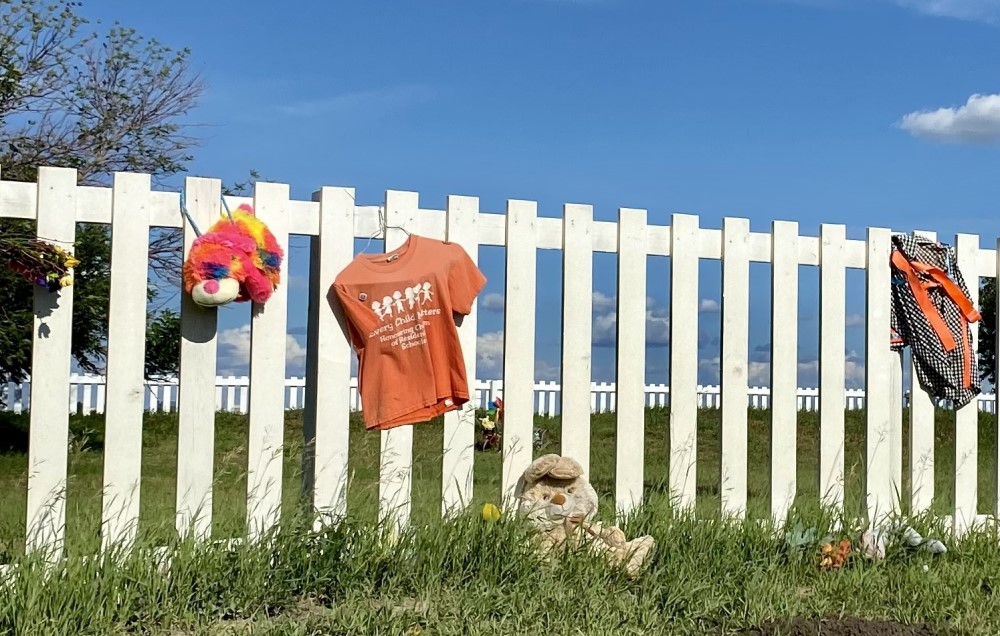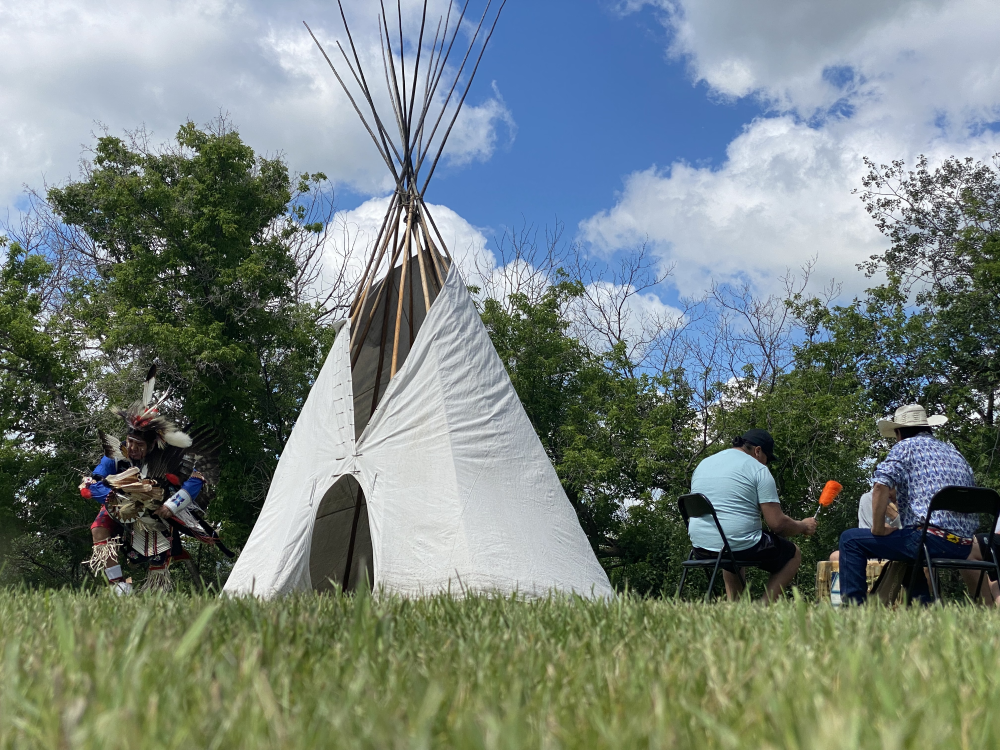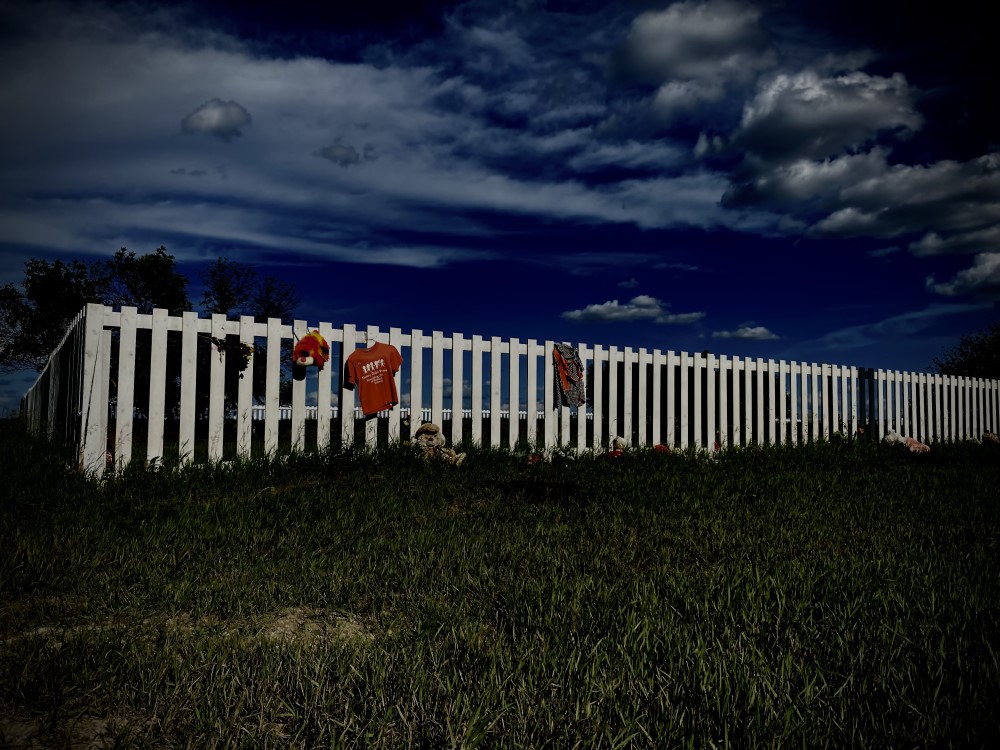June is National Indigenous History Month, which is quite fitting it seems as Indigenous history has been surfacing in the last few months. What does this have to do with the Building Code? Nothing. But in the off chance some of our readers were not aware of the heartache that has resurfaced, we wanted to share.
In May, 215 people, most of which are likely to be children, were found in unmarked graves at the Kamloops Indian Residential School in British Columbia. Last Friday, the Cowessess First Nation announced that 751 people, again mostly children, were found near Regina at the Marieval Indian Residential School. Regina is the capital of Saskatchewan, and my hometown.
Regina is also the home to an unmarked grave site found in 2014, where at least 38 children are buried. The site received a provincial Heritage designation in 2017. The site is on private land, so the designation protects it from being altered. The picture above is of the grave at 701 Pinkie Road, on the north-west edge of the city.
I’ve spent the majority of my life as a north-west resident of Regina, and have driven past the little white fence countless times. When I first learned it was a cemetery for a past residential school, it made me sad…but honestly I did not understand what that really meant. I did not fully understand what residential schools were. I don’t remember ever learning about them in school, and it wasn’t until Orange Shirt Day started being celebrated that I heard of the practice of tearing children from their homes. The thought of someone coming and taking one of my children makes me so angry and heartbroken… I still wonder how those who did these things justified it in their minds.

It was not until recently that I learned of the Sixties Scoop. The Sixties Scoop was a Canada-wide “effort” to remove Indigenous children and place them in non-Indigenous homes. This actually happened well before and beyond the 60s, from the 50s through to the 80s. Research shows that more than 20,000 children were taken.
What can we do better as Canadians?
So what now? Well a National Day for Truth and Reconciliation will be observed on September 30th, which is a small start. My hopes are that as these unmarked graves are discovered across the country, a small amount of peace can be brought to the families and communities who lost children. A positive I see is that Canadians are finally hearing and learning about the horrific history of residential schools and treatment of Indigenous peoples, and the trauma that has been faced and carried by all Indigenous people. The trauma didn’t stop when the last residential school was closed, it continues to have lasting affects, and will for many years to come.
A next step for my family is also to learn and celebrate the amazing culture of the Indigenous people. Learn how resilient they were and are. I’m not sure how many have experienced a Saskatchewan winter…but living in tipis through one is something I can not even fathom. Let’s educate our children on the mistakes of the past, but also expose them to the magic of learning about the amazing parts of the past as well. Go to the museum. Read books. Go to pow-wows. Children aren’t born with prejudices, they learn it. Let’s teach them the right things.

This last weekend we had the opportunity to attend a tipi raising, drumming and dancing in Lumsden, SK. The event was put on by Harold with Dancing Horse Dance Troupe. He shared some history, told a lot of great stories, and his humour and knowledge made him an absolute joy to listen to. If anyone is interested in having Dancing Horse Dance Troupe come out to an event, please reach out to me and I can pass along his information.
How can we do better as code consultants and design professionals?
Well, we don’t fully know that answer. But we can start by learning, listening, and having more conversations. Here are a few of our ideas, and we’re interested to hear what others think.
- Can we provide a reduced rate for projects and associations that support Indigenous communities?
- Can we learn about architecture and development groups that are openly supportive of Indigenous Peoples? Can we choose partners that align with our values…by their actions and not just their statements?
- Can we sit on municipal committees or attend town hall meetings that are discussing development strategies in racialized or culturally significant neighbourhoods?
- Are we listening, and turning down projects that Indigenous communities are actively resisting?
- Can we make a financial contribution to an education fund that provides opportunities to Indigenous youth pursuing engineering and architectural careers?
How can we do better as architects?
We are not architects, but have worked with some wonderful firms who are committed to truth and reconciliation. HCMA is one of them. Here is a statement from the firm on National Indigenous People’s Day 2019. In their statement they note that “We don’t offer any answers, but as an industry leader, we are listening and learning. Resources we have found useful are Michelle Nahanee’s Decolonizing Practices workshop and AIGA’s recent article, Decolonizing Design“.
How can we do better as building system service providers?
This is not our wheelhouse, but here are some suggestions. Looking forward to hearing your ideas:
- Buildings are always going to need maintenance. As a mechanical, electrical or structural company, can you provide a reduced rate for projects and associations that support Indigenous communities?
- Especially important are the life safety systems in a building. As a fire alarm or sprinkler service provider, can you provide special rates or go above and beyond to make sure buildings supporting the Indigenous community stay on top of inspection, testing and maintenance…especially those supporting a residential use?
- Can we provide job training opportunities to trade organizations that directly support Indigenous youth?
How can we do better as developers?
We are not developers, but have worked with many and have seen a wide range of priorities. Developers have so much opportunity to move forward. If you are a developer, here are some questions you can ask:
- How can I focus more on improving the human capital than financial capital?
- How can this development be an inclusive community where Indigenous people can thrive and grow?
- If past practices have not recognized systemic issues, how you can make it right and show up better?
- Does this development benefit or disadvantage the Indigenous community?
What are some groups in Regina, SK that we can support through our roles in the building industry?
Since I’m in Regina, and a lot of our readers are in Saskatchewan, I’ve put together a list of some of the organizations who support the Indigenous Community and could benefit our conscious support:
- Habitat for Humanity – Regina,
- The Gathering Place,
- The Ranch Ehrlo Society,
- Street Culture Project,
- Regina Early Learning Centre – Kids First,
- Newo Yotina Friendship Centre,
- Paul Dojack Youth Centre,
- Eagle Heart Centre,
- Foxvalley Counselling Services,
- White Raven Healing Centre, and
- File Hills Qu’Appelle Tribal Council.
If you’d like to see any other groups added to the list, please comment below, or contact us here.
What are some groups in Vancouver, BC that we can support through our roles in the building industry?
Since my Co-Founder Brenda is in Vancouver, I’ve put together a list of some of the organizations who support the Indigenous Community and could benefit our conscious support:
- Vancouver Aboriginal Health Society,
- Vancouver Aboriginal Child and Family Services,
- Vancouver Aboriginal Transformative Justice Services Society,
- Vancouver Aboriginal Friendship Centre Society, and
- Anhart Community Housing.
If you’d like to see any other groups added to the list, please comment below, or contact us here.
We wanted you to know where our hearts stand. If you have any resources or suggestions on how we as an industry can do better, please send them our way. We are open and want to listen and learn together.
Thank you for being part of our community.


4 Responses
Kelsey, you ask a lot of important questions here. More of us need to be asking questions like this. It’s ok not to have the answers. Those will come, but first we have to ask the questions, and actually WANT to hear the answers.
Too many people are saying “that was in the past, nothing to do with me, we just have to move ahead”. None of those statements are true. We won’t become a just and equitable country until we find the courage to face this harsh reality, and accept the uncomfortable truths that are revealed about our nation, and ourselves. Only then can we change and become something better.
Thanks for reading and commenting Neil. It is so unfortunate that some people want to just pretend that what happened is in the past and we should forget it.
I am hopeful that even though the discoveries have brought up so much hurt again for so many…it will lead to positive change. We have as a nation been forced to face and address what has happened, and that is a first step.